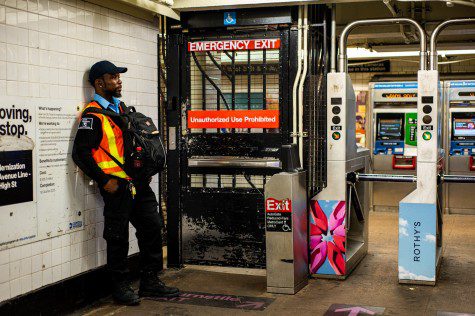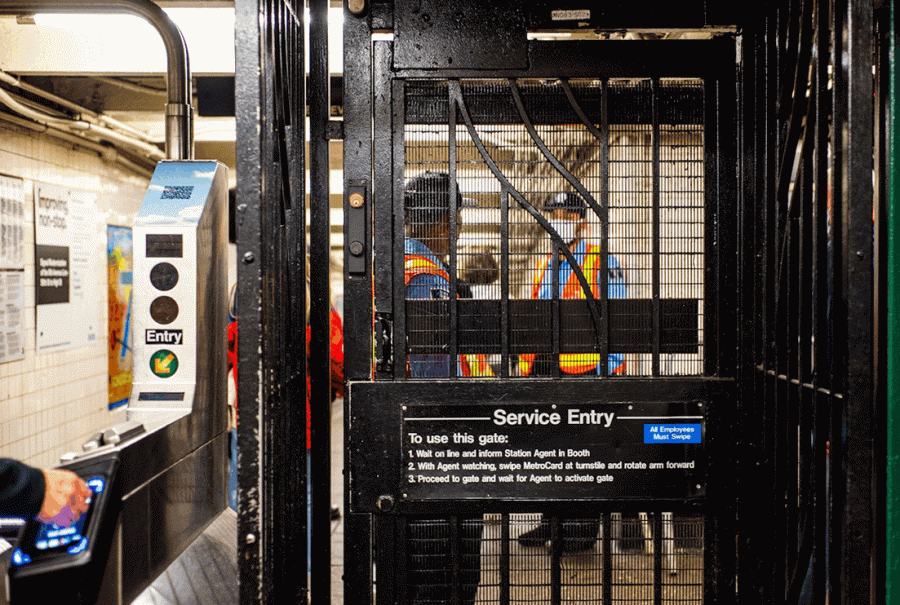Private security guards patrol emergency exits at West 4th subway station
The security presence, which began in early September, is unarmed and discouraged from physically confronting subway riders.
Private security guards stand at the emergency exit door of the West Fourth Street-Washington Square subway station. (Manasa Gudavalli for WSN)
October 19, 2022
At the often-crowded West Fourth Street-Washington Square subway station, one of the closest to NYU’s campus, officers from two private security contractors now stand in front of emergency exit doors and turnstiles. The officers have been patrolling the station since they were assigned to the post in early September.
The Metropolitan Transportation Authority contracts the officers from Allied Universal and City Safe Partners, two security companies with headquarters in the city. Though the presence of private security at the West Fourth Street station began recently, a spokesperson for the MTA said that the transit agency has contracted private officers since 2020 to supplement the organization’s security personnel and New York City Police Department officers.
An Allied Universal officer, who asked to be referred to as Brown due to concerns for his job, estimated that he and other officers had been at the station for about one month as of Oct. 6. According to Brown, the officers primarily serve as a liaison between the station and the NYPD, and their duties are limited. The officers are not armed by the MTA nor the companies they work for, though some bring personal items with which to defend themselves.
“In all honesty, all we do is just observe and report any incidents that may go on while we’re on the clock,” Brown said. “All we do is just contact the NYPD, call 911. We’re not really allowed to touch anybody. The most you can do is just give them instructions on what not to do, and if they don’t comply, then it is what it is.”
While the MTA did not say why additional security has been patrolling the West 4th Street station, Brown believes that the main motivation is to prevent fare evasion at the station, which he said occurs more frequently at the station than elsewhere.
According to ridership statistics, the West Fourth Street station was the 20th busiest in New York City in 2020, serving over 4.5 million passengers. It sees the highest rate of law enforcement action related to fare evasion in its transit district, with 3.9 interventions per 100,000 MetroCard swipes, according to NYPD data.

LS sophomore Katerina Koopman, who frequents the West Fourth Street station, said that on one occasion, officers ticketed her and several others after they exited through an emergency exit that was left open. She added that she was skeptical about whether the private security officers’ presence would deter crime.
“For fare evasion — it happens and it’s going to happen,” Koopman said. They might be discouraging it a little bit, but the money that they’re making by making those people pay the fares is probably less than the money that they’re spending to put the people there.”
The MTA declined to comment about the cost of employing private security.
Brown blamed unhoused people for many of the incidents that he said he has witnessed, attributing violent behavior and drug use to the unhoused population. (Advocates have argued that blame for crime is unfairly placed on unhoused people, explaining that they are victims of violent crime more often than they are perpetrators.)
“Some of them cause a ruckus, some of them just do their little drug trade,” Brown said. “Most of them smoke in here.”
Earlier this year, New York City Mayor Eric Adams launched an initiative that aims to remove unhoused people from subway cars and stations by deploying police officers and mental health professionals. Koopman said that she has witnessed several instances of police violently removing unhoused people from the station.
Contact Hope Pisoni at [email protected].

























































































































































